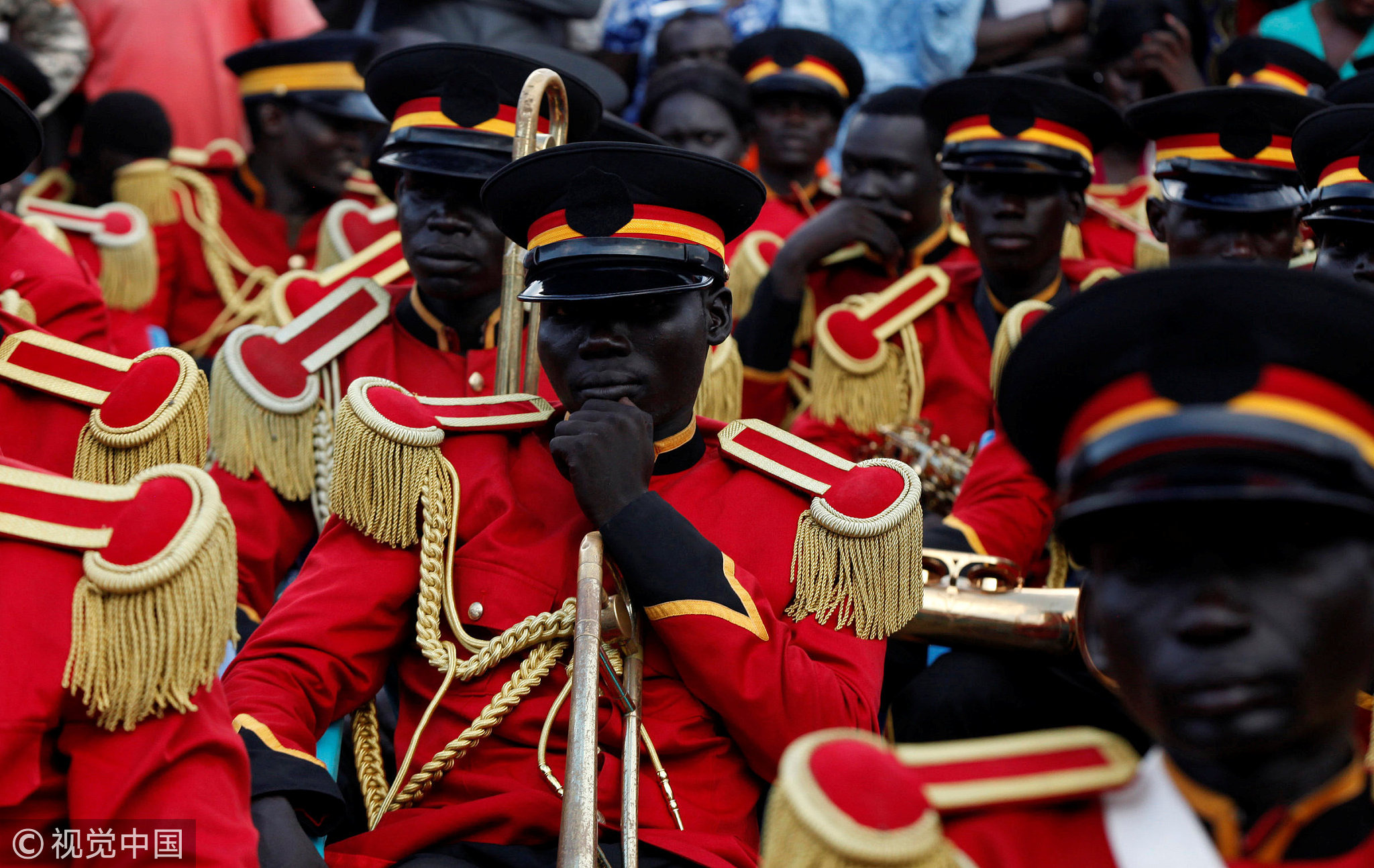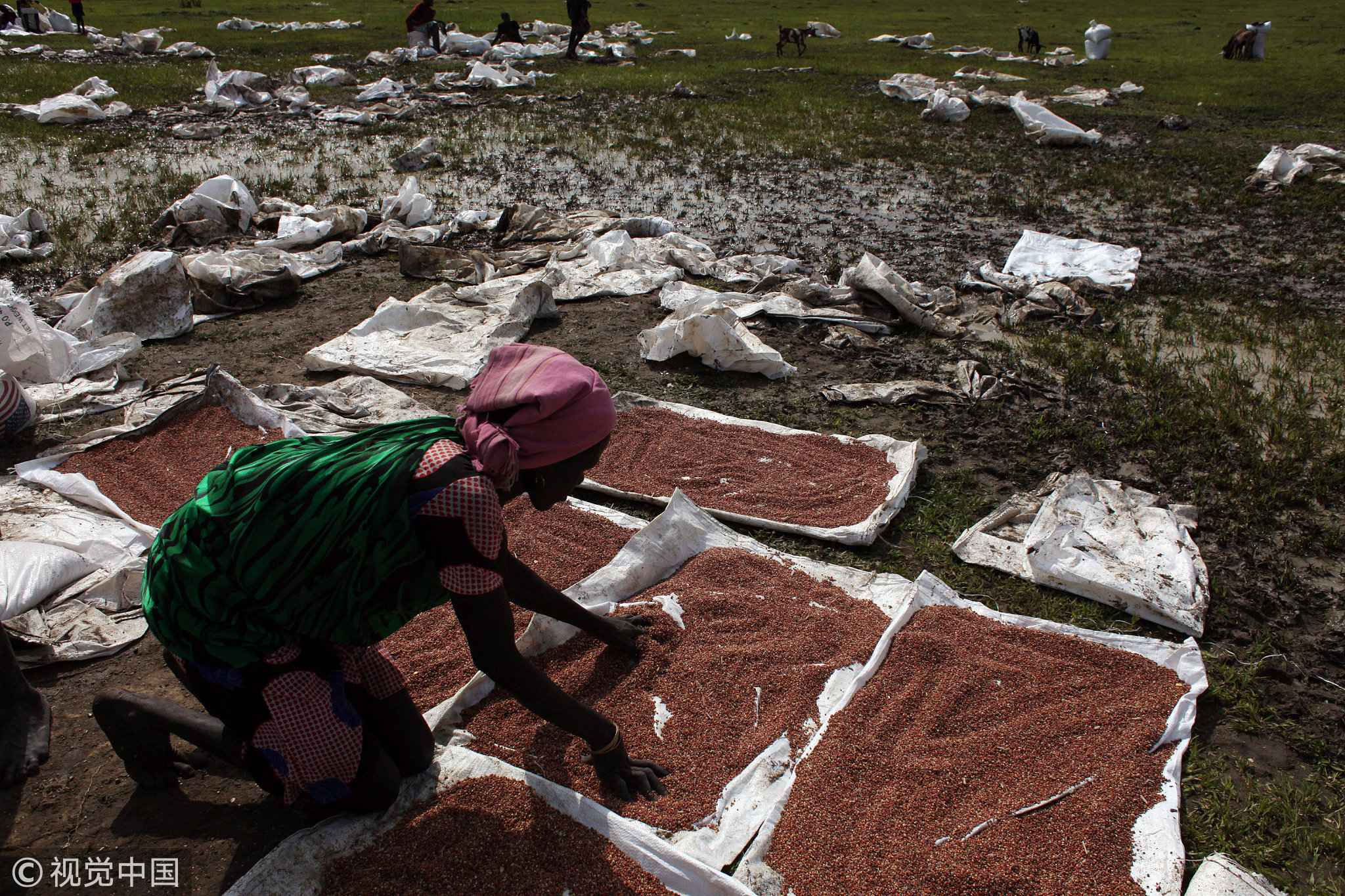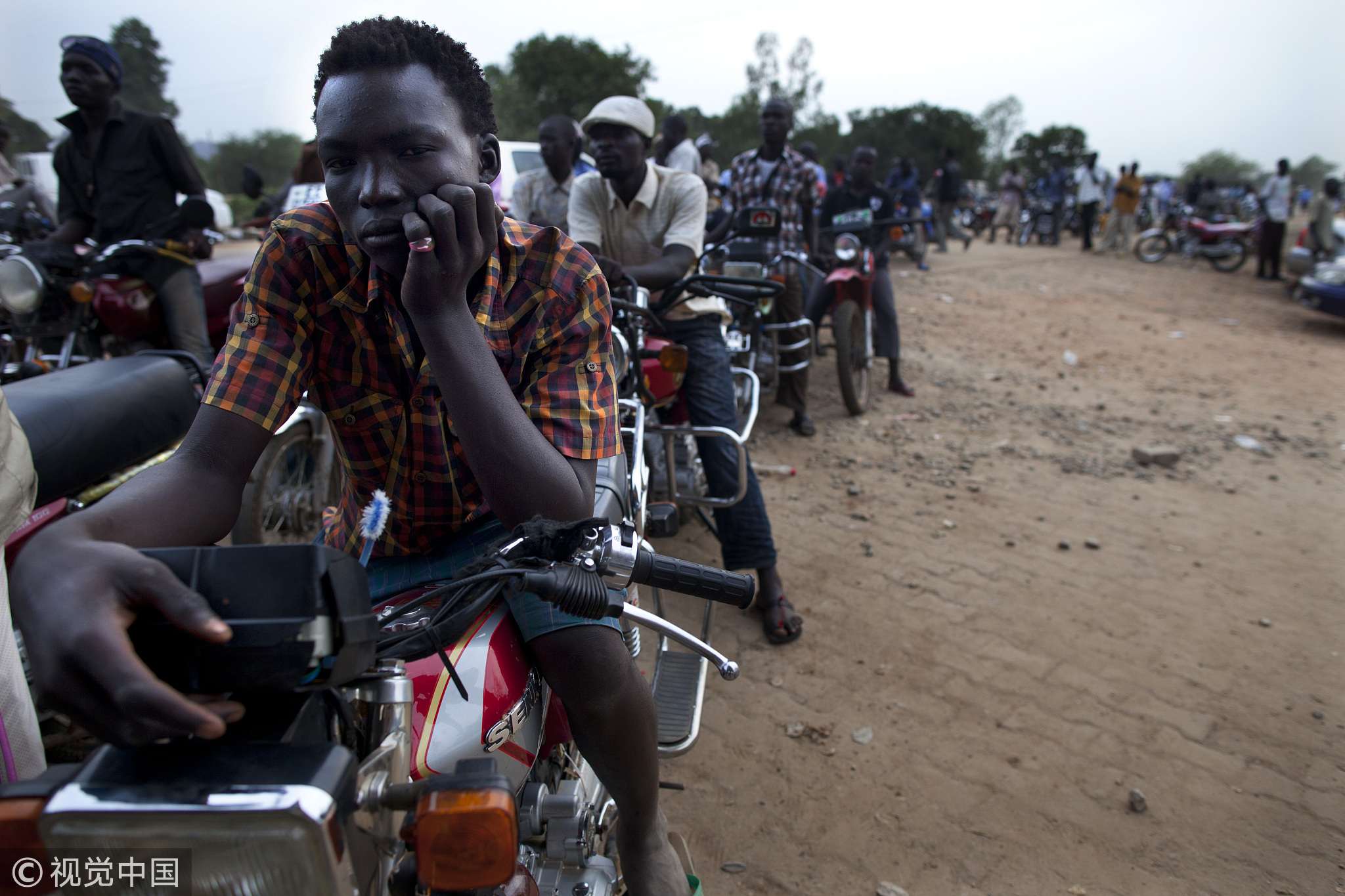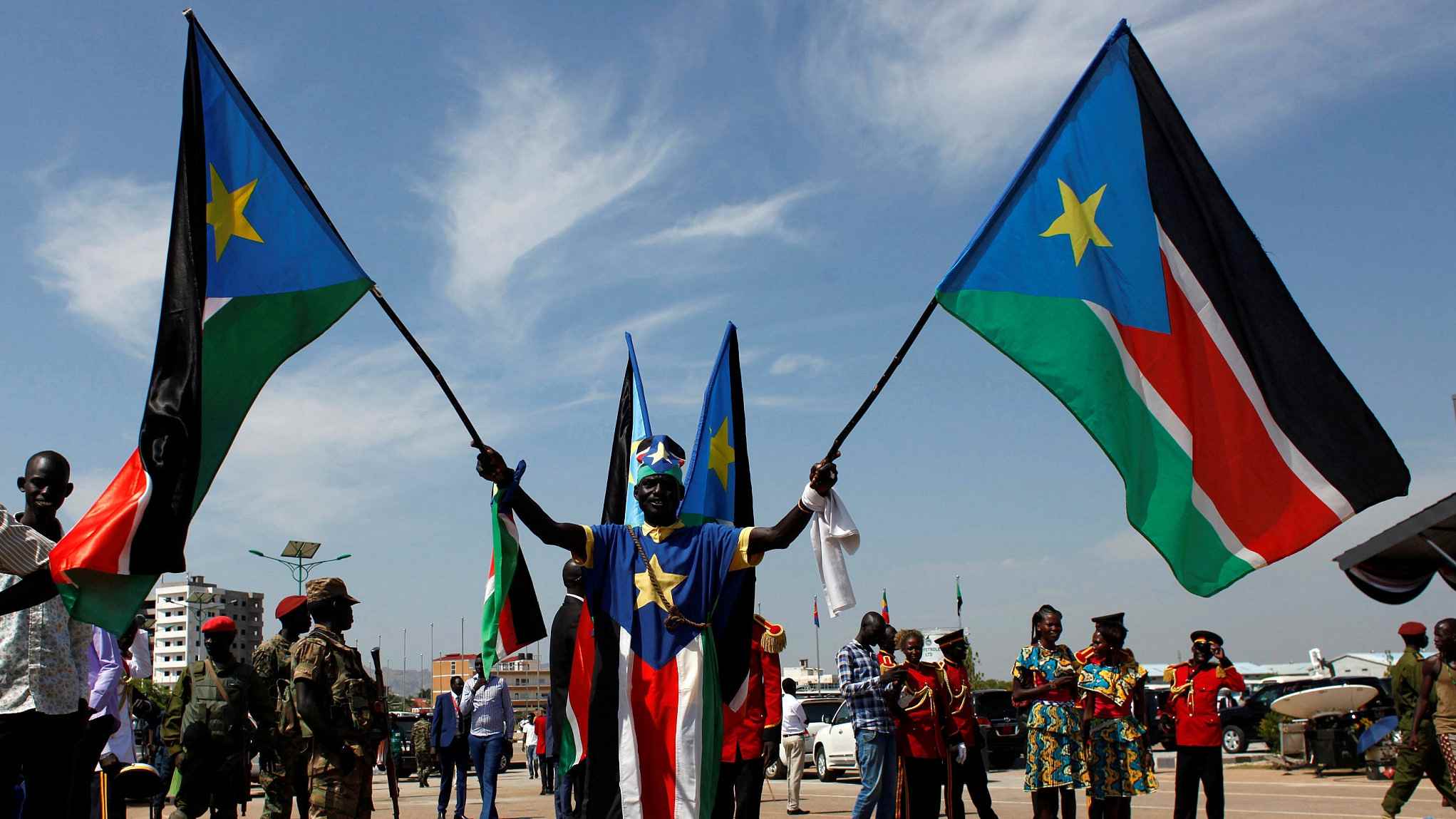Editor's note: Shen Shiwei is a research fellow of the Charhar Institute and former government relations and business consultant for Chinese enterprises overseas investment. The article reflects the author's views, and not necessarily those of CGTN.
The latest meeting of rivals, President Salva Kiir and opposition leader Riek Machar, aiming to restore peace, created a celebration in Juba, South Sudan, the youngest nation on the Earth which got involved in a devastating civil war soon after declaring independence in 2011. But, previous peace deals eventually disintegrated into brutal warfare, some even just a few hours after the signing.
With another peace deal, this one co-signed by neighboring heads of state of Sudan, Ethiopia and Uganda, bring a permanent peace to the 12 million people living in South Sudan? Maybe.

Members of the South Sudan military band are seen at the John Garang's Mausoleum in Juba, South Sudan October 31, 2018. /VCG Photo
Members of the South Sudan military band are seen at the John Garang's Mausoleum in Juba, South Sudan October 31, 2018. /VCG Photo
Power scrambling again
To resume a collapsed power-sharing deal is not easy.
Under the peace deal signed in Addis Ababa, Riek Machar, as the leader of South Sudan's main armed opposition group, is meant to return as Salva Kiir's deputy, the South Sudan First Vice-President. Salva Kiir was reluctant to accept outside pressure, while Riek Machar wants further negotiations.
In the agreement, a three-year transitional government will be finalized in eight months. Besides for the confirmed president and first vice-president position, the four vice-president vacancies will be equally controlled by both sides. In a cabinet of 35 ministers, 20 will go to Salva Kiir's camp and nine go to Riek Machar's side, with the leftovers going to other factions. A 550 member Transitional Legislative Assembly will also be shared by both parties.
The number of states is another main problematic point. Many opposition parties refused to accept Salva Kiir's decision to change the number of states from 10 to 32 in 2015. Machar believes that he could have more control in the previous 10 states, but for Salva Kiir, a 32 state proposal is more in his favor.
All disagreements are far less important than the control of the army, who really have the final say in South Sudan politics. The reality is still a united South Sudan national flag over disparate armed groups.

Presidents Mohamed Abdullahi Mohamed of Somalia, Yoweri Museveni of Uganda, Salva Kiir of South Sudan, Omar al-Bashir of Sudan, Sahle-Work Zewde of Ethiopia and South Sudan rebel leader Riek Machar attend peace celebrations at the John Garang's Mausoleum in Juba, South Sudan October 31, 2018. /VCG Photo
Presidents Mohamed Abdullahi Mohamed of Somalia, Yoweri Museveni of Uganda, Salva Kiir of South Sudan, Omar al-Bashir of Sudan, Sahle-Work Zewde of Ethiopia and South Sudan rebel leader Riek Machar attend peace celebrations at the John Garang's Mausoleum in Juba, South Sudan October 31, 2018. /VCG Photo
In the 2015 Agreement on the Resolution of the Conflict in the Republic of South Sudan, all rebels shall be integrated into the national army. However, the Juba gunfire in July 2016 split the armed oppositions into pro-government SPLM-IO (Juba faction) lead by Taban Deng Gai, with remained SPLM-IO (Machar faction) continue to support Machar.
While the politicians are wrangling over how many divided and ruled armed forces they could rely on, tens of thousands of South Sudanese are dying, and a quarter of South Sudan's population of 12 million people have fled the nation. It is one of the largest humanitarian disasters in African.
Abandoned by the US?
It is the first time that the US, the UK and Norway, the troika that ushered South Sudan's separation and independence from Sudan, decided not to guarantee the peace agreement.
Has South Sudan been abandoned by the US after its independence?
“We are asking the US not to abandon South Sudan because we need them, their role to assist the population of South Sudan is crucial and cannot be ignored”, urged by South Sudan Foreign Affairs Ministry this May after White House announces assistance review.
Frankly speaking, South Sudan is not on the prioritized list for White House anymore after Washington split the Sudan in 2011.

An internally displaced woman sorts grain at a food distribution by the World Food Program in the Sudd Swamp near the town of Nyal, in South Sudan August 19, 2018. Picture taken August 19, 2018. /VCG Photo
An internally displaced woman sorts grain at a food distribution by the World Food Program in the Sudd Swamp near the town of Nyal, in South Sudan August 19, 2018. Picture taken August 19, 2018. /VCG Photo
The US, the UK and Norway is in a dilemma. For years, President Kiir has blamed the collapse of previous peace agreements on foreign influence. Donations from the troika are important but they always interfere and take sides in the bloody civil war based on their interest. If the Juba government doesn't follow, sanctions and embargoes will be put on the table. This time, the troika chose to sit on the sidelines and not sign the peace agreement.
Skepticism on a peace deal implementation is growing.
Is money a solution or poison?
Years of nationwide civil war has uprooted four million of South Sudan's population, ruined its agriculture sector and destroyed oil production, a lifeline that accounts for 98 percent of the country's budget. To restore peace and normality from years of war, the cost is pretty huge.
According to the Food Security Phase Classification (IPC) report, more than half the population of South Sudan, or 6.1 million people, face severe food shortage as hunger continues to plague the country, despite the Nile enriched fertilized land.

Motorcycles line up for hours to get fuel before it runs out July 18, 2012 in Juba, South Sudan. /VCG Photo
Motorcycles line up for hours to get fuel before it runs out July 18, 2012 in Juba, South Sudan. /VCG Photo
Oil revenue is South Sudan's main hard currency earner. A severe shortage of foreign exchange has devalued the South Sudan pound sharply. At present, the high inflation rate is troubling the fragile economy. Back in August and October 2016, shortly after the resumed civil war, hyperinflation jumped to 730% and 835.7% respectively, according to South Sudan National Bureau of Statistics.
Therefore, international donors are South Sudan's lifeline for daily operation, but the rate fluctuates a lot.
Recently, South Sudan resumed pumping 20,000 barrels of crude oil per day from the Toma South oilfield, where production had been suspended since 2013 due to the civil war. But all political fractions are eager to get more shares in the oil income. Maybe we should be cautious about another oil field conflict triggering another war?
In South Sudan's power gambling party, its 12 million people are definitely the victim. Can the bumpy road to peace been fixed?
(If you want to contribute and have specific expertise, contact us at opinions@cgtn.com.)






